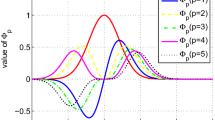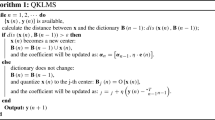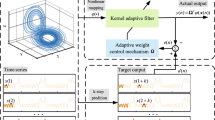Abstract
Kernel adaptive filtering algorithms have been successfully applied in many areas, among which the fraction lower power order statistics error criterion (FLP) is a better choice due to its prominent performance in robust design. However, the growth of network size in kernel adaptive filtering affects the convergence rate and testing accuracy. This paper proposes a sparse Gaussian kernel adaptive filtering algorithm based on the Softplus function framework to address the network size. The framework is constituted by the fraction lower power order statistics error criterion and an improved novelty criterion. The exponential loss function is employed to describe a new novel criterion, which can accurately achieve fast classification and limit the data selection of the dictionary size. This new algorithm is called the kernel fraction lower power order statistics error criterion based on the Softplus function with a modified novelty criterion (SKFLP-MNC) algorithm. In particular, the proposed method is employed for the Mackey–Glass chaotic time series prediction and noise cancellation under the cases of Gaussian and non-Gaussian noise. Simulation results show that the filtering accuracy of the SKFLP-MNC algorithm, the dictionary size, and steady-state mean-squared errors rival some of the sparse kernel least mean square algorithms.









Similar content being viewed by others
References
N. Aronszajn, Theory of reproducing kernels. Trans. Amer. Math. Soc. 68(3), 0337–0404 (1950)
N. Benoudjit, M. Verleysen, On the kernel widths in radial-basis function networks. Neural Process. Lett. 18(2), 139–154 (2003)
T. Bi, K. Jia, Z. Zhu, Intelligent islanding detection method for photovoltaic power system considering the inter-connection relationship of the electrical parameters. IET. Gener. Transm. Dis. 14(18), 3630–3640 (2020)
K. Chen, S. Werner, A. Kuh, Y. Huang, Nonlinear adaptive filtering with kernel set-membership approach. IEEE Trans. Signal Process. 68, 1515–1528 (2020)
B. Chen, S. Zhao, P. Zhu, Quantized kernel least mean square algorithm. IEEE Trans. Neu. Net. Lear. Sys. 23(1), 22–32 (2012)
B. Chen, S. Zhao, P. Zhu, J.C. Prncipe, Quantized kernel recursive least squares algorithm. IEEE Trans. Neural Netw. Learn. Syst. 24(9), 1484–1491 (2013)
B. Chen, X. Liu, H. Zhao, J.C. Prncipe, Maximum correntropy kalman filter. Automatica 76, 70–77 (2017)
J. Cioffi, T. Kailath, Fast, recursive-least-squares transversal fifilters for adaptive fifiltering. IEEE Trans. Acoust. 32, 304–337 (1984)
L. Csat, M. Opper, Sparse on-line Gaussian processes. Neural Comput. 14(3), 641–668 (2002)
S.C. Douglas, A family of normalized LMS algorithms. IEEE Signal Process Lett. 1, 49–51 (1994)
Y. Engel, S. Mannor, R. Meir, The kernel recursive least-squares algorithm. IEEE Trans. Signal Process. 52(8), 2275–2285 (2004)
C.S. Fausto, M.L. Guerrero, S. JavierAlvarez, A variable step size NLMS algorithm based on the cross correlation between the squared output error and the near-end input signal. IEEE Trans. Electr. Electron. Eng. 14(8), 1197–1202 (2019)
H. Fan, Q. Song, A linear recurrent kernel online learning algorithm with sparse updates. Neural Netw. 50(2), 142–153 (2014)
W. Gao, J. Chen, Kernel least mean square p-power algorithm. IEEE Signal Process. Lett. 24(7), 996–1000 (2017)
F. Huang, J. Zhang, S. Zhang, A family of robust adaptive filtering algorithms based on sigmoid cost. Signal Process. 149, 179–192 (2018)
Y.L. Huo, D.F. Wang, Kernel adaptive filtering algorithm based on Softpuls function under non-Gaussian impulse interference. Acta. Physica Sin. 70(2), 415–421 (2021)
J. Kivinen, A.J. Smola, R.C. Williamson, On learning with kernels. IEEE Trans. Signal Process. 52(8), 2165–2176 (2004)
D.C. Le, J. Zhang, D. Li, A generalized exponential functional link artificial neural networks filter with channel-reduced diagonal structure for nonlinear active noise control. Appl. Acoust. 139, 174–181 (2018)
C.H. Lee, B.D. Rao, H. Garudadri, A Sparse Conjugate Gradient Adaptive Filter. IEEE Signal Process. Lett. 27, 1000–1100 (2020)
W. Liu, J.C. Prncipe, S. Haykin, Kernel adaptive filtering: a comprehensive introduction, 1st edn. (Wiley, New York, 2010)
W. Liu, J. Prncipe, An information theoretic approach of designing sparse kernel adaptive filters. IEEE Trans. Neural Netw. 20(12), 1950–1961 (2009)
W. Liu, P.P. Pokharel, J.C. Prncipe, The kernel least-mean-square algorithm. IEEE Trans. Signal Process. 56(2), 543–554 (2008)
W. Ma, J. Duan, W. Man, H. Zhao, B. Chen, Robust kernel adaptive filters based on mean p-power error for noisy chaotic time series prediction. Eng. Appl. Artif. Intell. 58, 101–110 (2017)
W. Ma, X. Qiu, J. Duan, Y. Li, B. Chen, Kernel recursive generalized mixed norm algorithm. Franklin Instol. 355(4), 1596–1613 (2018)
C. Paleologu, J. Benesty, S. Ciochina, A robust variable forgetting factor recursive least-squares algorithm for system identifification. IEEE Signal Process Lett. 15, 597–600 (2008)
J. Platt, A resource-allocating network for function interpolation. Neural Comput. 3(2), 213–225 (1991)
C. Richard, J. Bermudez, P. Honeine, Online prediction of time series data with kernels. IEEE Trans. Signal Process. 57(3), 1058–1067 (2009)
S. Sankar, A. Kar, S. Burra, M. Swamy, V. Mladenovic, Nonlinear acoustic echo cancellation with kernelized adaptive filters. Appl. Acoust. 166, 107329 (2020)
A. Singh, J.C. Principe, Information theoretic learning with adaptive kernels. Signal Process. 91, 203–213 (2011)
M. Takizawa, M. Yukawa, Adaptive nonlinear estimation based on parallel projection along affine subspaces in reproducing kernel hilbert space. IEEE Trans. Signal Process. 63(16), 4257–4269 (2015)
M. Takizawa, M. Yukawa, Efficient dictionary-refining kernel adaptive filter with fundamental insights. IEEE Trans. Signal Process. 64(16), 4337–4350 (2016)
D. Tuia, J. Muoz-Mar, J.L. Rojo-lvarez, M. Martnez-Ramn, G. Camps Valls, Explicit recursive and adaptive filtering in reproducing kernel hilbert spaces. IEEE Trans. Neu. Net. Lear. Sys. 25(7), 1413–1419 (2014)
S. Wang, Y. Zheng, S. Duan, Quantized kernel maximum correntropy and its mean square convergence analysis. Digit. Signal Process. 63, 164–176 (2017)
L. Yang, J. Liu, R. Yan, X. Chen, Spline adaptive filter with arctangent momentum strategy for nonlinear system identification. Signal Process. 164, 99–109 (2019)
Y. Zhang, L. Peng, X. Li, A Sparse Robust Adaptive Filtering Algorithm Based on the q-Renyi Kernel Function. IEEE Signal Process. Lett. 27(99), 476–480 (2020)
J. Zhao, H. Zhang, J.A. Zhang, Gaussian kernel adaptive filters with adaptive kernel bandwidth. Signal Process. 166, 1072701–10727014 (2020)
Funding
Funding was provided by national natural science foundation of china (Grant no. 61561044).
Author information
Authors and Affiliations
Corresponding author
Additional information
Publisher's Note
Springer Nature remains neutral with regard to jurisdictional claims in published maps and institutional affiliations.
Rights and permissions
Springer Nature or its licensor holds exclusive rights to this article under a publishing agreement with the author(s) or other rightsholder(s); author self-archiving of the accepted manuscript version of this article is solely governed by the terms of such publishing agreement and applicable law.
About this article
Cite this article
Huo, Y., Wang, D., Qi, Y. et al. A new Gaussian Kernel Filtering Algorithm Involving the Sparse Criterion. Circuits Syst Signal Process 42, 522–539 (2023). https://doi.org/10.1007/s00034-022-02139-8
Received:
Revised:
Accepted:
Published:
Issue Date:
DOI: https://doi.org/10.1007/s00034-022-02139-8




